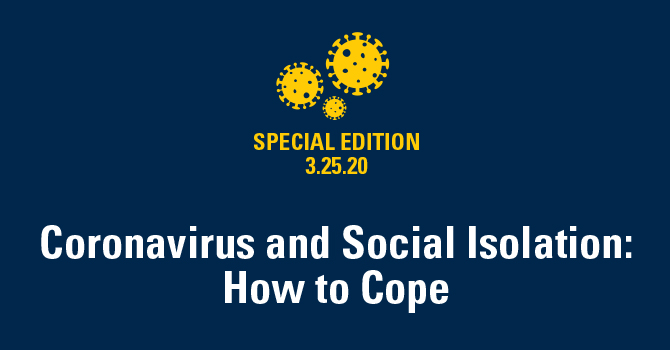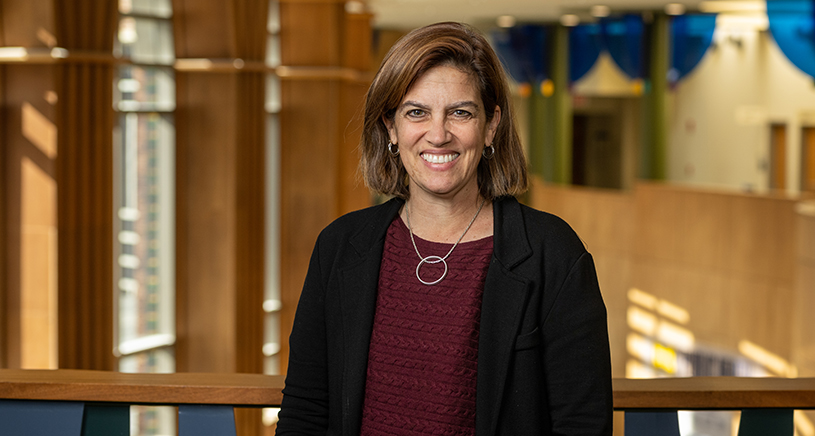Coronavirus and Social Isolation: How to Cope

The spread of COVID-19 has caused added stress for many. Those practicing social distancing may feel isolated from others, gig economy workers are worried about their exposure risk, and low income individuals are worried about their jobs. Alison Miller from the University of Michigan School of Public Health addresses methods for alleviating stress and who may be most vulnerable to these added stressors.
Listen to "Coronavirus and Social Isolation: How to Cope 3.25.20" on Spreaker.
|
Subscribe and listen to Population Healthy on Apple Podcasts, Spotify, Google Podcasts, iHeartRadio, YouTube or wherever you listen to podcasts! Be sure to follow us at @umichsph on Twitter, Instagram, and Facebook, so you can share your perspectives on the issues we discussed, learn more from Michigan Public Health experts, and share episodes of the podcast with your friends on social media. |
Speaker 1: One of the persistent messages during the coronavirus pandemic, is that we need to be unified in our efforts to stay away from each other. At the time of this recording, 12 states have issued stay-at-home orders affecting about 40% of the United States population. At a time when much of the population is practicing social distancing, losing direct connection with friends, colleagues and extended family, can introduce new stressors and exacerbate existing mental health concerns in an already stressful time.
Hello and welcome to Population Healthy, a podcast from the University of Michigan School of Public Health. This episode is part of a series of special additions of our podcast focusing on the ongoing coronavirus pandemic. Allison Miller is a developmental psychologist and associate professor of Health Behavior and Health Education at the University of Michigan School of Public Health.
We talked with her about the challenges social distancing can present and how we can all find ways to cope.
Miller: Social connection is really a primary way in which most of us cope with stress and it's really important for our social and emotional well-being - sort of a primary source of our emotional well-being. We vary in how much we need or prefer to engage in social interactions, so we could be introverts or extroverts, but in general humans are really social creatures, and we value our relationships with other people.
So under times of stress, our instinct is often to reach out to others to help ourselves feel better, so to be comforted by a friend or a loved one, or to do the same for other people. And when we can't do this, we may feel helpless, or lonely, so it really does interfere potentially with our ability to cope with stress.
But right now we're being told to stay either inside our homes or at least away from other people as much as we can. And so we don't have an easy go-to way to connect with people, and it needs to be virtual or six feet in distance. It becomes challenging with the COVID-19 situation because we are not used to only connecting virtually with others, even people who work from home usually have some sort of in-person connections across the course of their day. For example, going out to a store to a cafe or something like that. And that's right now shut down for everybody. And so that's not a social outlet that we have. When we're connecting virtually with people, it can be wonderful. And I know I've seen some things online about virtual happy hours and virtual coffee hours and that kind of thing, and I think that's a great development and that's a great strategy. It's not quite the same as doing it in person, but I think it also illustrates that, we're pretty adaptable and we're connecting virtually in the best way that we can.
When it comes to social distancing, it can be challenging because we're staying inside, often working from home and feeling a lack of interaction with other people who we may usually have in the course of our day. However, not everybody is able to work from home. The Gig Economy workers have been a lot in the news. So people like Uber drivers and food delivery which are really important in keeping the economy going and people being able to get groceries delivered remotely and that kind of thing. But those individuals are not able to stay home and self-isolate in a way that they could do if they could work from home. And so they're necessarily out in the environment and interacting with people which could place them at greater risk for COVID-19.
There are clear financial implications for people who are of lower income or have an unstable job or temporary employment. I know I've talked with a lot of people who are worried about temporary employment, what the implications of reduction in hours or even job loss may be for their income. And so I would say that's a very important group to be thinking about.
Speaker 1: While the causes and impacts of the stress are unique to each individual, there are some common methods anyone can employ to manage and cope with their feelings of isolation.
Miller: Things like deep breathing exercises or progressive muscle relaxation exercises. There are many different apps out there that offer this kind of exercise and there are even opportunities to engage in these behaviors virtually, sort of with a big group of people that are all doing the same activity but virtually, so everybody is doing a relaxation exercise together. And that really works on calming that stress. If you do that already, that's great. I would say, keep doing that. But it may also be a time to try some of these apps that you maybe have thought about but I've been too busy to try out. Because social connections and relational health are so important for our well-being, it is really important to try to keep those going. So even if you're physically distanced from people, take this time as an opportunity to reach out. Maybe connect with an old friend who you don't have time to call on a regular basis. Certainly reaching out to people who may be in the areas that are more hard hit by COVID-19 might be really important to do it this time.
We also can all benefit from just movement and some exercise if we can, if we can go outside. Now that it's getting to be springtime in Michigan, that's a nice thing to be able to do. There’s certainly research that shows when you are even looking at nature, it could be calming to the biological stress response. So that's the reason to get outside and move your body.
When thinking about how much you're monitoring the situation and how much news you're looking at, you wanna be informed, but you wanna limit the amount of time you're looking at news because that can be kind of stressful. And people have talked about going on the news diet, maybe letting yourself check-the CDC website, twice a day, for example. Related to that in terms of keeping healthy during this time, it's always really important to get good sleep. And what I would advise not doing is looking at stressful news media before sleep, and in fact not looking at screens at all before going to bed. But instead going for a book or something that will take your mind off of the COVID-19 situation before going to bed, so you can get good sleep.
And finally, I would say along the lines of positive well-being, we also know that it's important to engage in positive emotions, and reflect on positive things, and that can actually again be a very calming thing to do. There is some research on gratitude and feelings of gratitude, and reflecting on things that are positive in one's life can be calming and help with healing. So that would be another thing to think about. Think about things that you're grateful for, do acts of kindness for others, deliver your neighbors something that they might not be able to go out and get. If you're a parent and have little kids and they wanna make art projects for people, that's a great activity as well.
Speaker 1: This has been a special edition of Population Healthy, a podcast from the University of Michigan School of Public Health. During the ongoing coronavirus pandemic, we’ll work to bring you analysis from our community of experts to help you understand what this public health crisis means for you. To stay up-to-date in between special edition episodes, be sure to check out our website publichealth.umich.edu, subscribe to our Population Healthy newsletter at publichealth.umich.edu/news/newsletter and follow us on Twitter, Instagram, and Facebook @umichsph
In This Episode
 Alison Miller
Alison Miller
Associate Professor, Health Behavior & Health Education
Alison Miller is a developmental psychologist who studies risk and resilience in children and families. She studies basic developmental processes, including self-regulation of emotions, sleep, eating behavior, and neuroendocrine stress responses in young children. Learn more.
